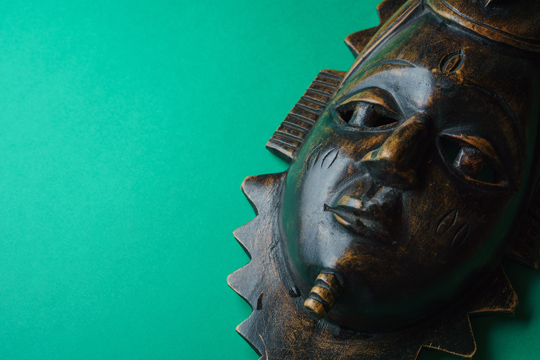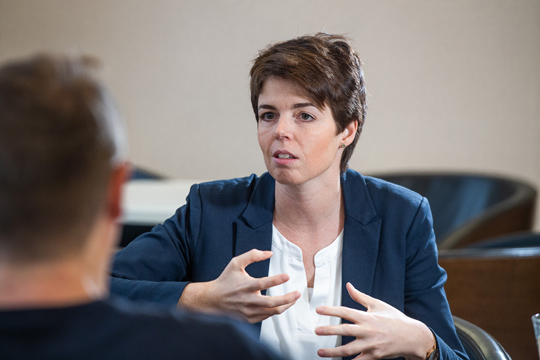“Like a wound that never heals”
Freiburg, Jan 15, 2020
By setting up encounters on an equal footing, helping to network experts locally and abroad, and seeking a dialog with society, the newly-established Africa Centre for Transregional Research (ACT) at the University of Freiburg hopes it can contribute. As part of this it’s organizing the Freiburger Afrikagespräche series of public lectures. The next lecture will be about the restitution of African cultural assets – an issue that has once again been hotly discussed in recent years. Mathias Heybrock interviewed Dr. Annika Hampel, head of the Africa Centre, on the social responsibility of European politicians and scientists.

In the 1970s and 1980s there was an intense discussion about the restitution of African cultural assets – but then the subject was simply forgotten. Photo: grek881/stock.adobe.com
Dr. Hampel, is it true that almost 90 per cent of all African cultural assets are outside the continent? It sounds incredible.
Annika Hampel: Yes, but sadly it’s true. The figure comes from a report on the return of African cultural assets which was published jointly by the Senegalese economist Prof. Dr. Felwine Sarr and the French art historian Prof. Dr. Bénédicte Savoy in 2018.
Bénédicte Savoy will be giving a lecture in Freiburg for the Freiburger Afrikagespräche lecture series on 22nd January 2020. What will her subject be?
She’s speaking on the fact that from 1979 to 1982 there was already a very intense discussion of restitution – but then the subject was simply forgotten. In conclusion she will also look at the present-day debate, and what it should lead to in future.
And what do you think that should be?
That we don’t just talk about it, but something is actually done. This is extremely important for our African partners and their confidence in us. We regard African artworks as objects. But for Africans they are subjects – important parts of their lives. And they often have a spiritual, religious significance. Losing them is like a wound that never heals. They are a perpetual reminder of the colonial era, of the violence experienced by the continent.
What is the University of Freiburg doing to drive the issue of restitution?
We’re part of the Namibia Initiative of the Federal State of Baden-Württemberg and took part in visits to Namibia that led in 2019 to the return of two exhibits from Stuttgart’s Linden Museum to Namibia – a whip and a bible that were once owned by the Namibian national hero Hendrik Witbooi. I too was involved in the preparations for the handover in Namibia.
So are there objects in Freiburg that should be returned?
Take the university’s anatomical collection, the Alexander Ecker Collection, which is more than 150 years old, for example. Since 2009 Freiburg scientists have been studying bones that are held in the collection for their historic and scientific origin. At the heart of this are skulls which probably came from what is now Namibia and from Australia. Based on detailed reports, in 2014 and 2019 fourteen skulls were returned to Namibia and six to Australia. We’re also in contact with Tina Brüderlin, the head of the Ethnology collection in Freiburg’s regional Museum für Natur und Mensch.
What impressions did you gain from this?
Prof. Dr. Andreas Mehler, director of the Arnold Bergstraesser Institute (ABI), and I gained access to the warehouse of the Ethnology collection, for instance. It was very impressive. However, as in many German museums’ warehouses, the items still need to be comprehensively and systematically recorded. But you need a lot of financial and staffing resources for this. So cultural policy needs finally to meet its responsibilities. Warehouses are handled quite differently in countries such as Canada.

Annika Hampel argues in favor of opening up the Ethnology collection: “It could be even better if our partners were not only able to work scientifically there, but could also incorporate the items into their everyday lives.” Photo: Klaus Polkowski
How exactly?
The warehouses are more open there. Anyone who is interested has easier access and can also work with the objects, provided they follow the rules, such as wearing protective gloves. I think opening up like this would be a good idea in Germany too. If our African colleagues had access to our collections and warehouses, could gain an overview for themselves, it would create trust. And it could be even better if our partners were not only able to work scientifically there, but could also incorporate the items into their everyday lives: why not hold a spiritual ceremony in the Ethnology collection warehouse?
And what part will the newly-established Africa Centre play in this?
It pursues the concept that encounters must take place on an equal footing and that an equal exchange forms the basis for a trusting cooperation and the solution to every problem. We will be inviting more African academics to Freiburg, so that they can contribute their perspectives on the issue of restitution, but with luck also on many other subjects. We’ll benefit from this.
The Africa Centre isn’t the first advance in Freiburg in this field.
There’s a lot of excellent research into Africa in Freiburg, but some don’t know anything about each other. Of course, everyone knows the ABI, that’s where political and social scientists work. But there’s also a lot of Africa expertise in legal studies at the university, as well as in Ethnology. Then another as-yet very young institution is the Maria Sibylla Merian Institute for Advanced Studies in Africa (MIASA), a joint institution set up by the Universities of Freiburg and Ghana. We in the Africa Centre want to strengthen this networking. In future we will combine existing expertise better and in addition promote dialog with the community. It’s already going well.
Really? Tell me more.
Our Freiburger Afrikagespräche lecture series is drawing a large audience, with an encouragingly diverse public: Africans and Germans, highly-educated people and less so. At our first Africa lecture, someone stood up and said he had just been on safari in Namibia for the first time and had a question. I felt that the fact that no one felt excluded, that everyone was ready to join in the discussion, was a great compliment to the lectures. This accessibility is exactly what they are aiming for.
Lecture by Bénédicte Savoy
In the Freiburger Afrikagespräche lecture series, Prof. Dr. Bénédicte Savoy will be speaking on the subject of “Zurück in die Zukunft. Die Restitution afrikanischer Kulturgüter aus historischer Sicht” on 22nd January 2020. The lecture starts at 18:30 in the Haus zu Lieben Hand, Löwenstraße 16. Anyone who is interested is welcome to attend.
Freiburger Afrikagespräche

